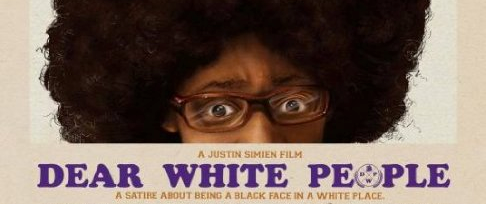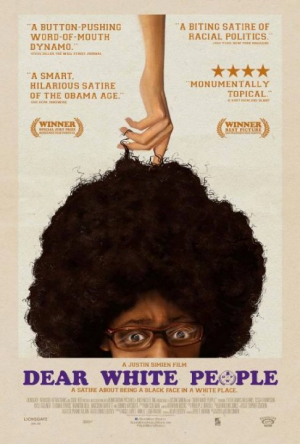Justin Simien, one of Variety’s 10 Directors to Watch, is the writer/director of the critically acclaimed film Dear White People, which won the Special Jury Award for Breakthrough Talent at Sundance 2014. In addition to producing and directing online companion pieces for The Help, Best Exotic Marigold Hotel, and Middle of Nowhere campaigns, he has also written, produced, and directed for TakePart TV and the Streamy-nominated web series INST MSGS. Originally from Houston, Texas, Simien currently lives in Los Angeles.
HJAAP: This year was a racially charged year in American political life. How do you see the responsibility of the Black filmmaker in terms of shaping and influencing the American public’s perception of Black people, and particularly young Black American men, given that perception is often the primary driver for policy makers making policy that impacts Black lives?
SIMIEN: Black artists have been struggling with this question since the Harlem Renaissance, but I tend to agree with those who felt that the role of art should above all else be to tell the truth. Sometimes the truth can lead to favorable “perceptions” of its subjects and sometimes it doesn’t, but when stories tell the truth, it allows an audience to see the humanity in characters who may be coming from different points of view. Beyond perception, I think the heart of the problem is the unwillingness or inability of those in power to put themselves in the shoes of people who don’t look or think like them. With that in mind, I think one of the most profound ways art can transform culture is by expanding empathy and sparking dialogue.
HJAAP: In the wake of the highly publicized non-indictments of police officers who shot and killed unarmed Black men, the nation watched as protests erupted across American cities and towns. Artists and athletes also took this opportunity to use their platforms to speak out and further focus attention on the issue. In your view, does the spotlight that comes with fame come with a certain civic responsibility to raise awareness about continuing racial injustices?
SIMIEN: I, like many people, was completely outraged over the non-indictments as well as the way in which the media was covering them, focusing mostly on “looting” and “rioting” rather than the systemic causes of these injustices. I took to my Twitter account and, of course, spoke on relevant issues at Q&As of my film. But I can’t say I did that out of responsibility. It’s how I was feeling, and I happen to have more of an audience for my opinions than I’ve had before. But I actually think we place too much of an emphasis on famous people to shape and mold the cultural conversation. The skill set it takes for someone to have a string of hit singles or hit movies is the not always the same as leading a needed national dialogue on important issues.
HJAAP: What are your thoughts on the #BlackLivesMatter movement?
SIMIEN: It’s sparking much-needed dialogue and increasing the visibility of issues that otherwise would be more easily pushed under the rug.
HJAAP: You recently sat on a panel with legendary filmmaker Spike Lee. It’s been twenty-five years since Do the Right Thing was released. In what ways did that film impact your own career? How do you think the American movie industry has changed since the release of that movie?
SIMIEN: That film taught me that telling Black stories and being artistically daring weren’t mutually exclusive ideas. It blew my mind on multiple levels. Not only is it, in my mind, a masterpiece, but it’s also a masterpiece by a Black auteur tackling a story about Black lives. To be honest, I think the industry has grown more myopic than it was when Do the Right Thing came out. Spike Lee himself said that the film couldn’t get made at the studio level these days. I imagine it would also struggle (as most films with Black casts do) to find independent investors thanks to the outdated but pervasive myth that Black films don’t perform well overseas.
HJAAP: Your first major film, Dear White People, was commercially released nationwide in summer 2014. What was that moment like for you?
SIMIEN: Strange. It’s been a dream for such a long time. I feel torn between wanting to soak it in and immediately moving on to the other stories in me dying to be told.
HJAAP: Watching Dear White People, it seemed like you wanted to use your movie as a vehicle to spark a national conversation about the pervasiveness of racism even in the most unlikely places—that is, at elite institutions of higher education. Do you think that conversation has occurred, and what kind of reactions have you witnessed while touring the country?
SIMIEN: I certainly wanted to spark conversation. But for me the movie at its core is more about identity than anything else: the war between who we really are and how we’re perceived by the culture around us. I stress the difference, because as a story about identity it has proven to be incredibly universal—connecting with people from Atlanta, to New York, to Stockholm, regardless of the racial makeup of the audience. I think telling an honest story about Black characters struggling with identity requires racism and racial issues to factor into the world of the story, but my main focus here was identity. I’ve found the film to be eye-opening for people regardless of race or age. I’ve also found it to be challenging for some people, as it raises some questions that some members might find uncomfortable. All of the characters do things we want to root for and things we don’t, which I think is honest and more powerful than if they were just dogmatically projecting a certain code of behavior to the audience. I didn’t want to make a morality play or a dogmatic statement. I wanted to tell some truth and get people in the lobby and in the office having the conversations that can actually move the culture forward.
HJAAP: What’s your next move as a filmmaker? Do you have any projects in the pipeline that our readers should keep in mind?
SIMIEN: The film Make a Wish was reported with Anthony Mackie as something I’m doing at Paramount. I’m also writing two new scripts as well as working on a potential television project.
HJAAP: What final thoughts would you like to leave our readers with?
SIMIEN: Support independent film. It’s where the truth is being told and the medium of film is being stretched.

